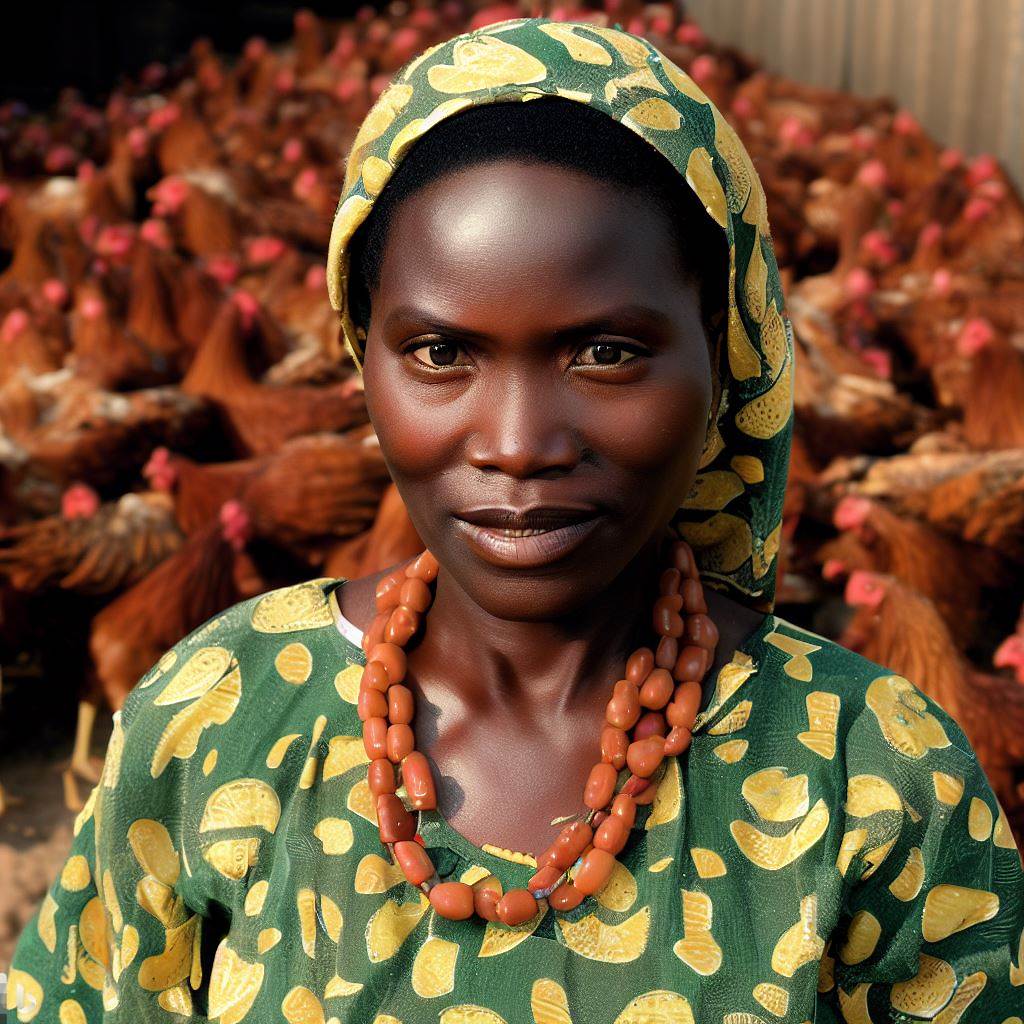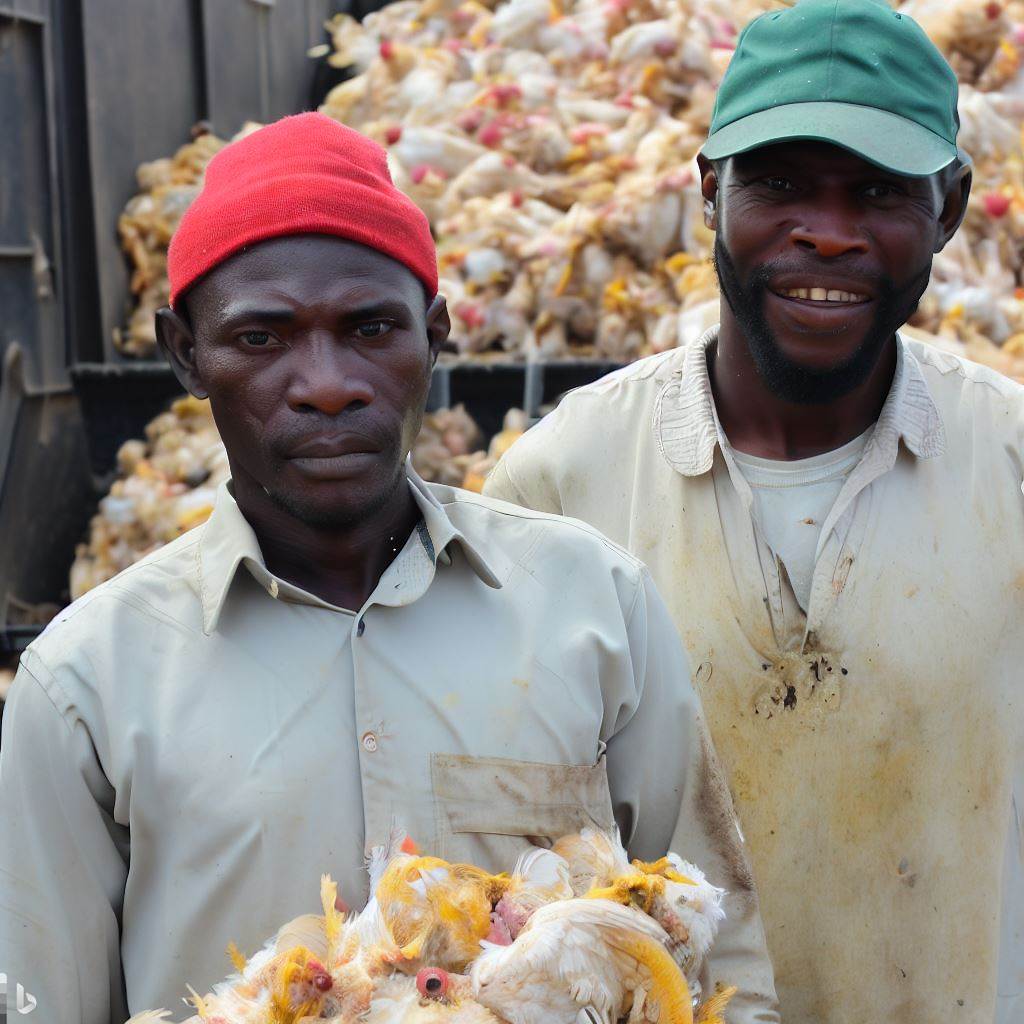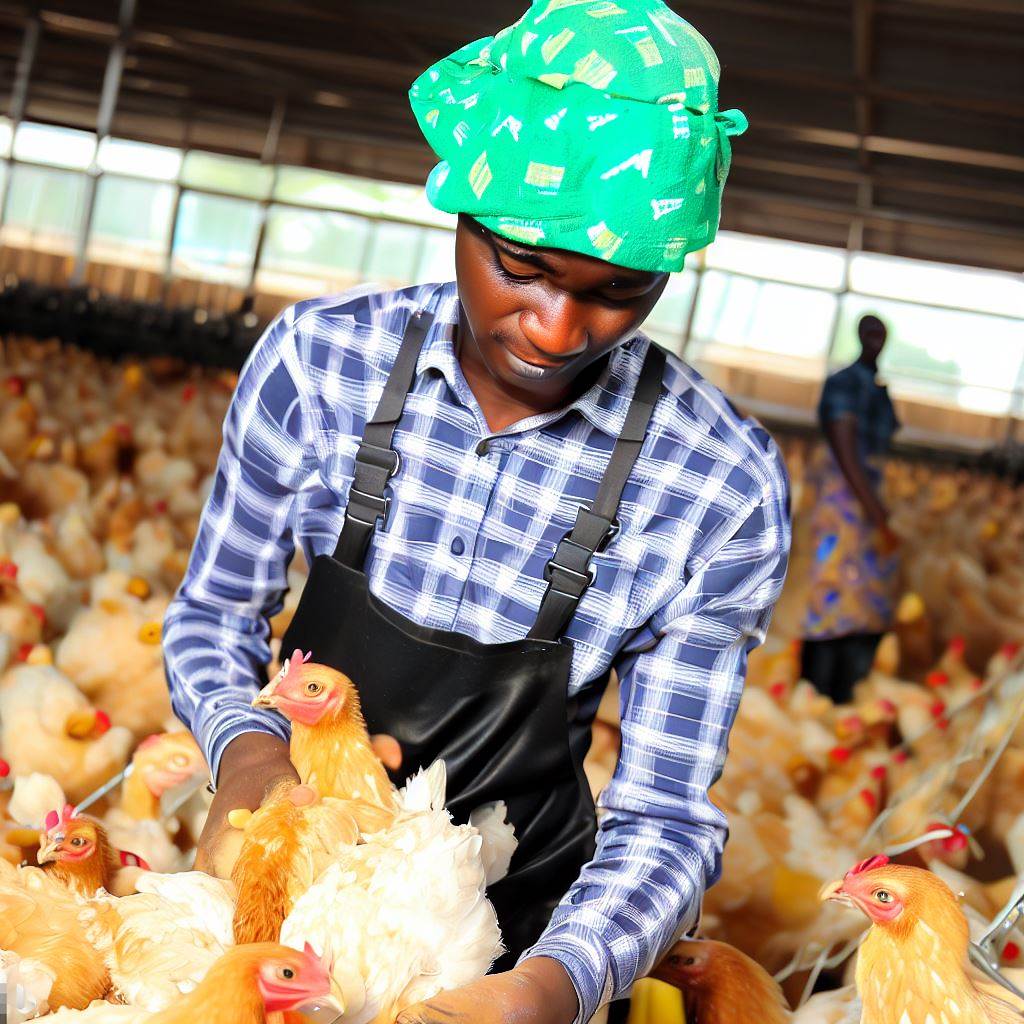Introduction
The power of Poultry in Boosting Food Security is a crucial step in addressing the nation’s food shortage.
Nigeria, with its large population and increasing urbanization, faces significant challenges in ensuring food availability and access for its citizens.
Food security, a fundamental need for any nation, refers to the availability, accessibility, and utilization of food that meets the dietary needs of individuals.
In Nigeria, where agriculture is a key sector, achieving food security is vital for economic development and social welfare.
However, Nigeria has struggled with food security due to various factors, such as inefficient agricultural practices, inadequate infrastructure, and climate change.
This has resulted in high levels of malnutrition, particularly among vulnerable groups like children and pregnant women.
To overcome these challenges, there is an urgent need to invest in sustainable and inclusive agricultural practices, such as poultry farming. Poultry farming offers numerous benefits for enhancing food security in Nigeria.
Firstly, poultry farming provides a significant source of animal protein, essential for a balanced diet.
With the rising demand for protein-rich food, poultry farming can bridge the protein gap and improve nutrition among Nigerians.
Secondly, poultry farming has the potential to generate income and employment opportunities.
As a labor-intensive sector, it can stimulate economic growth and reduce poverty, particularly in rural areas where unemployment rates are high.
Moreover, poultry farming is a relatively low-cost and adaptable practice that can be easily adopted by small-scale farmers.
By empowering smallholder farmers with knowledge and resources, Nigeria can promote agricultural entrepreneurship and increase food production.
In short, boosting Nigeria’s food security through poultry farming is essential in overcoming challenges and ensuring a sustainable food system.
By prioritizing investment and support for this sector, Nigeria can improve nutrition, create employment, and achieve long-term food security for its population.
Overview of Nigeria’s Food Security Situation
Food security is a pressing concern in Nigeria, a nation of over 200 million people. Many struggle to access sufficient nutritious food due to challenges like outdated farming practices and climate change impacts, leading to low crop yields.
Infrastructure limitations and inadequate storage systems contribute to post-harvest losses, disrupting the food supply.
Financial constraints hinder small-scale farmers from investing in quality seeds and machinery, reducing crop potential.
Conflict-driven farming disruptions and oil dependence further strain food security.
Rapid population growth intensifies the demand for food, pressuring resources. Poverty compounds the issue, limiting access to nutritious food.
Efforts are underway to address food security, including government initiatives and sustainable agriculture programs.
Poultry farming is gaining recognition for enhancing food security by providing protein and employment.
By bolstering poultry farming, Nigeria can decrease import reliance, boost domestic production, and fortify food security.
In fact, Nigeria’s food security hinges on tackling diverse challenges.
Through modern farming investments, better infrastructure, and small-scale farmer support, the nation can improve its food security. The power of poultry in this endeavor is significant.
The Role of Poultry in Enhancing Food Security
When it comes to boosting Nigeria’s food security, poultry farming plays a vital role.
Not only does it contribute to the country’s agricultural economy, but it also provides significant nutritional benefits and meets the high demand for poultry products.
Contribution of Poultry Farming to Nigeria’s Food Security
- Poultry farming is an essential component of Nigeria’s agricultural sector, providing a sustainable source of protein for its growing population.
- It is a cost-effective and efficient way to produce meat and eggs, which are crucial dietary staples for many Nigerians.
- The poultry industry creates employment opportunities across the value chain, from farmers and breeders to distributors and retailers.
- Increasing investment in poultry farming presents an opportunity to reduce Nigeria’s dependence on imported poultry products and strengthen its food self-sufficiency.
Nutritional Benefits of Poultry Products
- Poultry products, such as chicken and eggs, are rich in essential nutrients, including high-quality proteins, vitamins, and minerals.
- Consuming poultry meat helps in muscle development, strengthens the immune system, and aids in tissue repair.
- Eggs are a complete source of protein and provide essential amino acids necessary for the body’s growth and maintenance.
- Poultry products also contain essential vitamins like vitamin B12, which plays a crucial role in the formation of red blood cells.
High Demand and Market Potential for Poultry Products in Nigeria
- Nigeria has a rapidly growing population, and as the urban middle class expands, the demand for poultry products is increasing.
- The taste preferences, affordability, and versatility of poultry products make them a popular choice among Nigerian consumers.
- Poultry products have a shorter production cycle compared to other livestock, allowing farmers to meet the market demand more efficiently.
- Export opportunities for Nigerian poultry products exist, presenting the potential for foreign exchange earnings and boosting the economy.
In the end, poultry farming plays a crucial role in enhancing Nigeria’s food security.
Its contribution to the agricultural sector, nutritional benefits, and market potential make it an essential component of the country’s food supply chain.
By investing in poultry farming and promoting its growth, Nigeria can ensure a sustainable and sufficient supply of protein-rich poultry products for its population.
Economic Impact of Poultry Farming
Economic benefits of poultry farming for small-scale farmers and entrepreneurs
When examining poultry farming, it is important to consider the economic benefits it offers to small-scale farmers and entrepreneurs.
- The poultry industry provides a significant source of income for these individuals.
- By raising chickens, they can sell the eggs and meat to local markets and make a profit.
- This income allows them to support their families and improve their quality of life.
- In addition to income generation, poultry farming has the potential to create numerous job opportunities.
- As the industry expands, more positions will be needed in various sectors such as production, processing, and distribution.
- These jobs can help alleviate unemployment and provide livelihoods for many Nigerians.
Contribution of poultry farming to Nigeria’s GDP
Furthermore, the contribution of poultry farming to Nigeria’s GDP should not be underestimated.
- The poultry sector is a significant contributor to the country’s overall economic growth.
- According to the Nigerian Bureau of Statistics, the agriculture sector, which includes poultry farming, accounted for 25% of Nigeria’s GDP in 2020.
- This highlights the importance of poultry farming in driving the nation’s economic development.
- Not only does it provide income and employment, but it also contributes to the overall economic stability of the country.
Potential for job creation through poultry farming
Moreover, poultry farming has the potential to enhance food security in Nigeria.
- With a growing population, it is crucial to have a sustainable and reliable food production system.
- Poultry farming plays a vital role in meeting the protein needs of Nigerians.
- Through the production of eggs and chicken meat, it provides a valuable source of nutrition.
- By supporting poultry farmers, the government can ensure a steady supply of affordable and nutritious food for its citizens.
All in all, poultry farming offers significant economic benefits for small-scale farmers and entrepreneurs in Nigeria.
- Not only does it provide a source of income, but it also has the potential to create employment opportunities.
- Furthermore, poultry farming contributes significantly to Nigeria’s GDP and overall economic growth.
- By supporting this industry, the country can enhance its food security and improve the well-being of its citizens.
Read: The Economics of Poultry Production in Nigeria
Enhancing the Poultry Sector in Nigeria
In order to boost Nigeria’s food security, it is imperative to enhance the poultry sector in the country.
This can be achieved through various government initiatives, policies, training programs, capacity building, and the adoption of innovative technologies.
Government Initiatives and Policies to Support Poultry Farming
- The Nigerian government has implemented several initiatives to support poultry farming.
- These initiatives include providing subsidies for inputs such as feed, vaccines, and equipment.
- Government policies have focused on creating an enabling environment for the poultry industry to thrive.
- Efforts have been made to improve access to credit facilities for poultry farmers.
- The government has also prioritized the development of infrastructure such as roads and electricity in rural areas.
Importance of Training and Capacity Building Programs
- Training programs and capacity building initiatives play a crucial role in improving the poultry sector.
- These programs provide farmers with essential knowledge and skills in poultry management.
- They help farmers to understand best practices in poultry farming, including disease prevention and control.
- Capacity building programs also focus on improving farmers’ financial literacy and business management skills.
- Furthermore, these programs empower women and youth to actively participate in the poultry sector.
Innovative Technologies and Best Practices in Poultry Farming
- Innovation is key to enhancing the poultry sector in Nigeria.
- The adoption of innovative technologies can greatly improve production efficiency and reduce losses.
- New technologies, such as automated feeding systems and climate control, help optimize poultry production.
- Best practices, such as proper biosecurity measures, are vital for preventing disease outbreaks.
- Poultry farmers should also focus on improving the quality of feed and implementing effective waste management systems.
In essence, the poultry sector in Nigeria can be enhanced through government support, training programs, and the adoption of innovative technologies.
The government’s initiatives and policies contribute to creating a favorable environment for poultry farming.
Training and capacity building programs equip farmers with the necessary skills to succeed in the industry.
Finally, the adoption of innovative technologies and best practices ensures improved productivity and sustainability in the poultry sector.
By prioritizing these strategies, Nigeria can achieve greater food security and economic growth.
Read: Guide to Starting a Poultry Farm in Nigeria: Steps & Tips

Addressing Challenges in the Poultry Industry
In Nigeria, poultry farmers encounter several challenges that hinder the growth and development of the industry.
Despite these obstacles, there are viable solutions and interventions that can be implemented to mitigate these challenges and strengthen the poultry sector.
Identifying Key Challenges
- Limited access to finance and high interest rates make it difficult for poultry farmers to expand their operations.
- Inadequate infrastructure, such as poor road networks and lack of electricity, hampers the transportation and storage of poultry products.
- Poor market access and the dominance of imported poultry products pose significant challenges to local farmers.
- Inefficient waste management practices lead to environmental pollution and health risks.
- Unpredictable weather patterns, including heavy rainfall and extreme heat, affect the production and health of poultry.
- Lack of technical knowledge and skills among poultry farmers limits their ability to implement best practices.
Solutions and Interventions
To address these challenges, various interventions must be implemented at different levels:
- Government Support: The government should provide accessible and low-interest loans to poultry farmers, promoting financial inclusion and growth in the sector.
- Infrastructure Development: Investments in rural infrastructure, like road networks and electricity, would improve transportation and storage facilities, reducing losses and increasing market access.
- Promoting Local Consumption: Encouraging consumers to prioritize locally-produced poultry products through campaigns and policies can boost the market for local farmers.
- Improved Waste Management: Implementing proper waste management systems will protect the environment, improve hygiene, and prevent the spread of diseases.
- Climate-Resilient Practices: Training programs and support should be provided to farmers, enabling them to adopt climate-resilient practices and safeguard their poultry against extreme weather conditions.
- Enhancing Knowledge and Skills: Encouraging partnerships between research institutions, extension agents, and farmers will boost knowledge sharing and equip farmers with the necessary skills and techniques.
The Importance of Disease Control and Biosecurity Measures
Disease control and biosecurity measures are crucial elements for ensuring poultry health and productivity.
Implementing strict biosecurity measures helps prevent the introduction and spread of diseases in poultry farms.
This includes controlling farm access, proper disinfection protocols, and effective pest control.
Regular vaccination programs should be implemented to protect poultry from common diseases.
Monitoring and early detection of diseases through regular veterinary inspections are vital to minimize the impact on flock health.
Additionally, farmers should practice good hygiene, such as proper waste disposal and regular cleaning and disinfection of poultry houses.
These measures significantly reduce the risk of disease transmission within and between farms.
By effectively addressing disease control and practicing stringent biosecurity measures, the poultry industry can thrive, contributing to Nigeria’s food security and economic growth.
Most importantly, the Nigerian poultry industry faces numerous challenges that hinder its growth.
However, with the implementation of appropriate interventions and solutions, these challenges can be mitigated.
By focusing on improved infrastructure, government support, disease control, and biosecurity measures, the poultry industry can overcome its obstacles and play a significant role in boosting Nigeria’s food security.
Read: Local Chicken Breeds for Poultry Farming in Nigeria
Success Stories in Poultry Farming for Food Security
Nnenna’s Entrepreneurial Journey began humbly, with a small flock of chickens.
Today, her farm is a cornerstone of the community, supplying eggs and meat widely. She achieved this through modern techniques, better breeds, and improved nutrition.
The Community Poultry Project united local farmers for a collective impact.
With pooled resources and shared management, their large-scale farm now meets local demand for eggs and meat, enhancing food security and income.
Yusuf’s Innovation transformed poultry farming. His technology-driven system, featuring automation and data analysis, not only boosted his farm’s productivity but inspired others, improving food security and attracting investment.
The Women’s Cooperative embraced organic, eco-friendly practices.
Their quality products earned popularity and organic certification, empowering female farmers and promoting sustainability.
Samuel’s Training Center turned his farm into a hub for aspiring poultry farmers.
Through practical training and mentorship, he’s cultivated a skilled generation, elevating employment, self-sufficiency, and nationwide food security.
These tales underscore poultry’s potential in ensuring food security.
Innovations, technology, community efforts, and education create a ripple effect, amplifying local impact and inspiring others to contribute to Nigeria’s food security.
Read: Overcoming Common Diseases in Nigerian Poultry Farms
Conclusion
Poultry farming plays a critical role in enhancing Nigeria’s food security. By providing a consistent and reliable source of protein, poultry farms contribute to meeting the nutritional needs of the Nigerian population.
Additionally, the poultry sector creates employment opportunities and contributes to the country’s economic growth.
To ensure the continued success of the poultry industry and further boost food security, it is essential to maintain support and investment in the sector.
The government should continue to provide necessary infrastructure, such as access to electricity and water, as well as implement favorable policies and regulations.
This will encourage more individuals and businesses to engage in poultry farming, resulting in increased production and availability of poultry products.
Furthermore, sustainable practices should be prioritized in the poultry sector.
This includes implementing measures to minimize environmental impacts and reduce the use of antibiotics and chemicals.
By promoting sustainable practices, the industry can mitigate the negative effects on the environment and contribute to a healthier and more sustainable food system.
In summary, poultry farming has immense potential to boost Nigeria’s food security.
With continued support, investment, and implementation of sustainable practices, the poultry sector can play a crucial role in meeting the nutritional needs of the population and driving economic growth.
It is imperative that all stakeholders work together to ensure the success and sustainability of the poultry industry in Nigeria.




